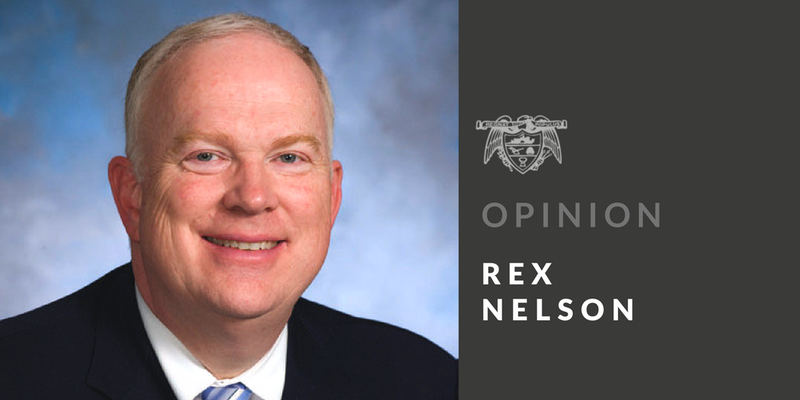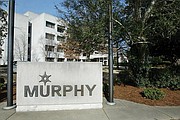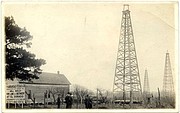One would have thought that the city of El Dorado was about to disappear based on the tone of the news stories and social media posts earlier this month when Murphy Oil Corp. announced it was closing its headquarters there and moving to Houston.
The Murphy Oil name has been so closely associated with El Dorado through the decades that most Arkansans had no idea that Murphy USA Inc.--which is staying put--has far more employees there than Murphy Oil.
It's not good that about 80 white-collar jobs will be lost in the south Arkansas city due to Murphy Oil's decision. But Murphy USA, which spun off from Murphy Oil in 2013, employs almost 600 people in El Dorado and continues to grow. It ranks among the top 300 U.S. corporations by revenues on the Fortune 500 list and operates retail fuel operations in more than 25 states.
Here's how John Baine of El Dorado put it in a May 8 social media post: "I've seen reporting on the departure of Murphy Oil from El Dorado as some sort of death blow or nail in the coffin for my hometown. It's a sad event. I know many of those being directly impacted by this move. I hate to see this as much as anyone. What I would say to those reporting on the departure from afar is that 'Murphy' isn't leaving El Dorado. Yes, the Murphy Oil brand is leaving. Yes, there's a rich history associated with the brand that has made south Arkansas, especially El Dorado, far better off for it. We can never say enough about what Murphy Oil has done for our hometown.
"Back in 2013, Murphy Oil had a spinoff, which in reality was Murphy Oil dividing into two publicly traded companies. The original oil production side stayed with the iconic name Murphy Oil and the newer side of the business, retail sales, fully evolved into the standalone business we all know as Murphy USA. I often see people right here in El Dorado consider everything that either Murphy Oil or Murphy USA does to better our community as something Murphy Oil did. I don't think there's a true appreciation of the level of support that Murphy USA has shown to El Dorado since 2013."
On May 14, the Murphy Arts District, a $100 million effort to transform downtown El Dorado into a regional center of arts and culture, issued its clarification: "From the outset, Murphy Oil Corp., Murphy USA Inc. and the Murphy Foundation were the leading financial supporters of this new nonprofit entity. At the same time, backing for this enterprise has also been provided by numerous other sources, including the city of El Dorado, the state of Arkansas, the Walton Foundation and many more generous corporate and individual donors.
"As a nonprofit arts district, MAD will always need philanthropic aid to supplement its revenues from operations. News of Murphy Oil's difficulties and its relocation will certainly impact its funding in the near term. However, the Murphy Foundation and Murphy USA have reaffirmed their support of MAD. ... In the current state of uncertainty surrounding entertainment venues and restaurants, it should also be noted that MAD is fortunate to be debt free. ... the foundation of our mission at MAD continues to be to create an exciting, diverse calendar of events."
Just across Cedar Street from the 1929 Rialto Theater downtown is a small park with displays chronicling the oil boom that transformed El Dorado. One marker describes the cold afternoon of Jan. 10, 1921, when a physician and oil speculator named Sam Busey struck oil at a well near El Dorado. The plume of oil that sprayed into the sky could clearly be seen throughout the town of 3,800 residents. By 1925, El Dorado's population had soared to almost 30,000.
"The town would never be the same," the marker reads. "Church bells rang, the sawmill whistle sounded and people streamed out of town to see the oil spewing up through the 75-foot wooden derrick."
By 1922, there were 900 wells operating in the state. Twenty-two trains ran in and out of El Dorado each day. Now, 99 years after the oil boom began, downtown El Dorado is hopping again. Yet it has nothing to do with oil exploration, which has been depressed in these parts for years. Instead, it's about music, theater, art, food and wine. The goal is to turn El Dorado into the arts and entertainment capital of a region that includes south Arkansas, north Louisiana, east Texas and parts of west Mississippi. That goal still exists after Murphy Oil's departure.
El Dorado Festivals & Events Inc. was created in 2011 and charged with giving life to this vision. The Griffin Building, constructed in 1928-29 during the oil boom to house an automobile dealership and gas station, was transformed into a fine-dining venue and an indoor performance hall that holds more than 2,000 seated patrons. An adjacent amphitheater was built to hold 8,000 people for outdoor concerts. There's a two-acre children's playground and splash pad.
A planned second phase of the project will transform the Rialto into an 850-seat hall for film festivals, touring productions and performances by the South Arkansas Symphony Orchestra. A new lobby will connect the Rialto to the 1928 McWilliams Building, a former furniture store and warehouse that will become an art gallery, a home for visiting artists and the host of traveling exhibitions from around the world.
Last spring, I went to El Dorado to emcee the groundbreaking ceremony for a boutique hotel to be known as The Haywood. The shovels went into the dirt and the cameras clicked as city leaders, wearing hardhats for the photo op, participated.
The early spring weather couldn't have been better that day with temperatures in the 70s. In old neighborhoods throughout the city, azaleas and dogwoods were beginning to bloom. Hope springs eternal in the spring, and it was evident that day that folks in El Dorado were hoping The Haywood would be another successful piece in a complex puzzle that's designed to offset the population losses that beset south Arkansas.
Despite all that has happened since then, I expect the momentum to resume once the pandemic ends. There are still visionary leaders, college scholarships for graduates of El Dorado High School through the El Dorado Promise initiative, and MAD.
The El Dorado Promise, which Murphy Oil will continue to fund, provides graduating seniors with a grant for tuition and expenses at any two-year or four-year institution of higher education in the country. The Murphy Oil board approved an initial investment of $50 million in December 2006 to fund those scholarships.
The next year, voters passed an economic development tax. In 2011, a $43 million high school opened, and numerous advanced placement courses were added to the high school curriculum. The El Dorado Conference Center, a $14.4 million facility downtown, also was dedicated in 2011. MAD was simply the next step in a coordinated effort to create a jewel in the pine woods of south Arkansas.
None of those amenities will move to Houston. When the pandemic ends, El Dorado will have concerts at MAD, fine dining, a destination hotel, one of the region's top golf courses (Mystic Creek), world-class art exhibitions, a first-class high school, a modern conference center and a growing Murphy USA.
Don't be too quick to write that obituary.
------------v------------
Rex Nelson is a senior editor at the Arkansas Democrat-Gazette.
Editorial on 05/24/2020


